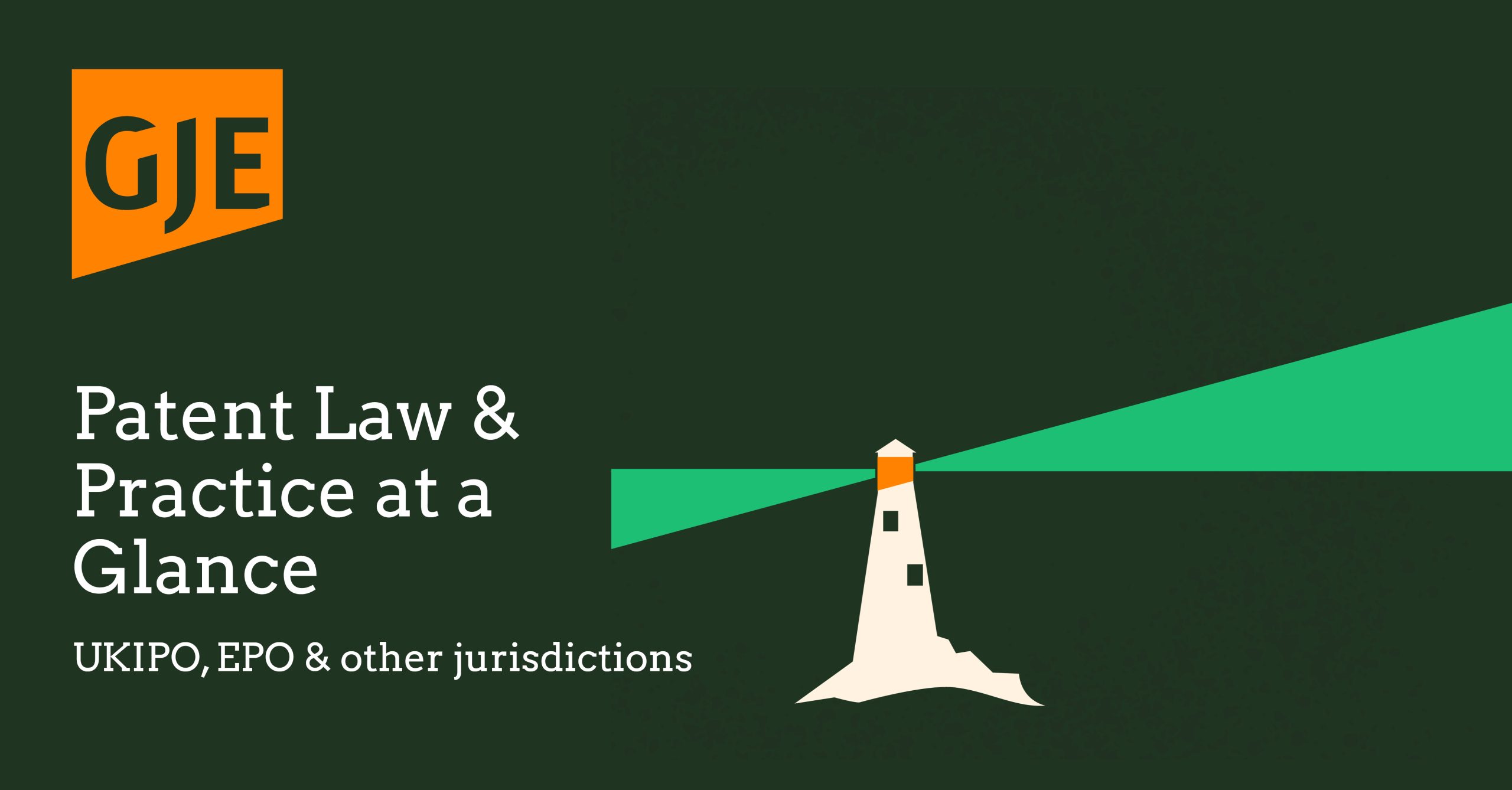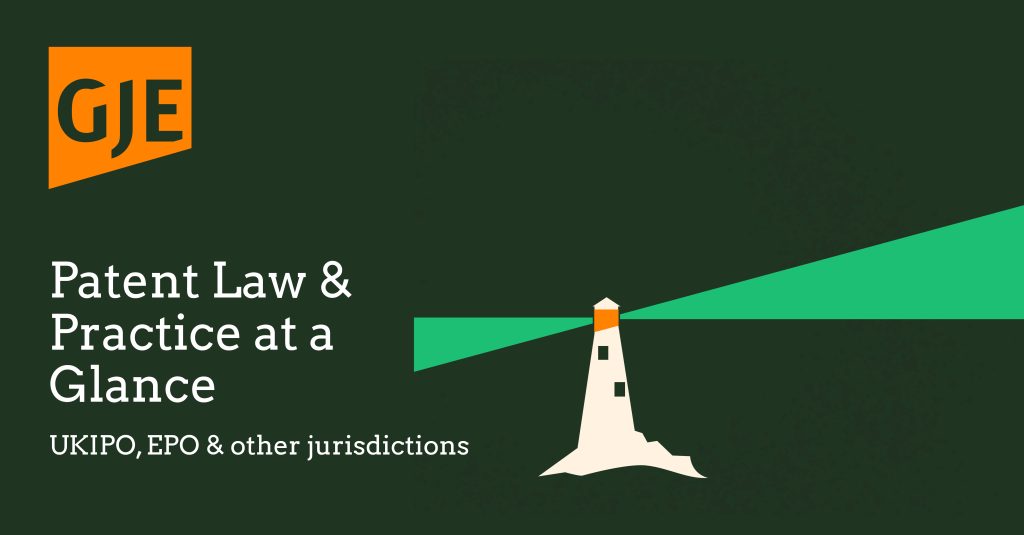
We regularly review changes to patent law and practice at the UKIPO, EPO and in other jurisdictions so that we can keep abreast of the latest developments. Please feel free to contact your usual GJE contact if you have questions on any of these changes or how they might affect specific cases.
UK UPDATE
Pilot scheme for capping costs in patent cases
On 1 January 2024, a pilot scheme was launched to cap costs for patent cases in the Shorter Trial Scheme within the Patents Court, with the aim of improving access by reducing costs for less complex cases. The pilot will run until 31 December 2026 and introduces a cap of:
- £500,000 on the final determination of a claim in relation to liability
- £250,000 on an inquiry as to damages or account of profits
More information on the scheme can be read here.
UK Voluntary Code of Good Practice on Transparency in Music Streaming
The UKIPO have published the UK Code of Practice on Transparency in Music Streaming. This a Voluntary Code agreed by trade body signatories on behalf of their members as a framework for minimum standards for good practice in their dealings with everyone involved in the music streaming industry, including signed Music Makers, and is focussed on the UK market. The code can be read here.
Protecting your UK intellectual property abroad
Intellectual property rights are territorial and only give protection in the countries where they are granted or registered. The UKIPO have produced brief guides for protecting trade marks, patents, designs, and copyright abroad. The guides can be read here.
A more detailed guide has also been published focusing on filing international patent applications under the Patent Cooperation Treaty (PCT) for private applicants. This guide can be read here.
Consultation – Extension of public performance rights to foreign nationals
The government is seeking views on changes to how foreign nationals qualify for broadcasting and performance rights in UK copyright law. More details on the consultation including how to respond can be found here.
UK-China IP
The UKIPO publishes a newsletter targeted at UK stakeholders and including updates on recent development in Chinese IP. The latest edition of this newsletter can be found here.
Filing statistics
The statistics for December 2023 are now available here. Statistics for previous months can be found here.
Customer service standards
The latest update on how the IPO are doing relative to the targets they have set themselves can be found here.
EPO UPDATE
Fee updates
The EPO has published updates to a number of its fees, with the changes taking effect from 1 April 2024. The new fees are set out in a number of decisions here, here, here, and here.
The changes also include amendments to Rule 6 EPC and Article 14 RFees, both of which relate to reductions in fees when filing translations. Th changes introduce a new fee reduction scheme specifically for micro-entities and will enter into force on 1 April 2024. See more details here.
New EQE
The EPO has issued the Decision of the Administrative Council bringing in the new EQE. The full details are available here, with the transitional provisions set out in Article 25 and the details relating to the entry into force of the new EQE set out in Article 27 being of most interest.
Once the new exams enter into force, then if candidates have passed:
(a) the pre-examination, they are exempted from sitting foundation paper F and main examination paper M1;
(b) Paper A, they are exempted from sitting part 1 of main examination paper M3;
(c) Paper B, they are exempted from sitting part 2 of main examination paper M3;
(d) Paper C, they are exempted from sitting part 3 of main examination paper M3;
(e) Paper D, they are exempted from sitting main examination papers M2 and M4.
Starting in 2025, paper F will be held for the first time alongside papers A, B, C, and D. In 2026, papers F, M1, and M2 will be held, still alongside papers A to D. However, 2026 is the last year that papers A to D will be held, with only the new EQE modules being held from 2027 onwards.
There are also details of the new exam available here.
New Guidelines
As set out here, the Guidelines for Examination have been amended and will enter into force on 1 March 2024.
The PCT-EPO Guidelines have also been updated, with the amended version entering into force on 1 March 2024. Details available here.
Remedies available at the EPO after the earthquake in Japan on 1 January 2024
In view of the earthquake around the Noto Peninsula in Japan on 1 January 2024, the EPO has drawn attention to the general legal remedies provided for under the European Patent Convention in cases of non-observance of time limits and, more specifically, to Rule 134(5) EPC. Details available here.
Validation in Georgia
As of 15 January 2024, European patents may be validated in Georgia. Details available here, here, and here.
Postal acknowledgments of receipt
As of 1 February 2024, the EPO has abolished the practice of requesting and sending postal acknowledgments of receipt. As a consequence, all summonses and decisions issued on or after 1 February 2024 by the Receiving Section, the examining or opposition divisions, the Legal Division or the Unitary Patent Division no longer include acknowledgements of receipt.
Version of EPO OLF software (epoline) to be used
As of 1 January, filings made using versions of the EPO OLF software earlier than version 5.14 will no longer be accepted by the EPO’s receiving server.
Discontinuation of issuing EPO smart cards
As of 1 January 2024, the EPO has stopped issuing EPO smart cards. The decommissioning of EPO smart cards is planned for 1 January 2025 as the EPO moves to using two-factor authentication. Details available here.
Handling of ST.25 sequence listings filed as a safeguard as part of divisional applications to which WIPO Standard ST.26 applies
WIPO Standard ST.26 applies to divisional applications submitted on or after 1 July 2022. Consequently, if a Standard ST.25-compliant sequence listing is part of the parent application, it must be converted into one complying with WIPO Standard ST.26. The EPO recommends that applicants use the WIPO Sequence software to generate ST.26-compliant sequence listings and strictly follow the guidance on conversion provided in Annex VII to WIPO Standard ST.26 and on the EPO website. The EPO has published further guidance here.
Accelerated processing of oppositions where an infringement or revocation action has been instituted before the Unified Patent Court or a national court or competent authority of a contracting state
The EPO will therefore accelerate its processing of parallel opposition proceedings if it is informed by the Unified Patent Court or a national court or competent authority of a contracting state that an infringement or revocation action relating to a European patent or a Unitary Patent has been instituted before it. Details here.



